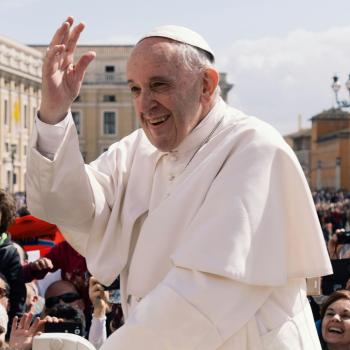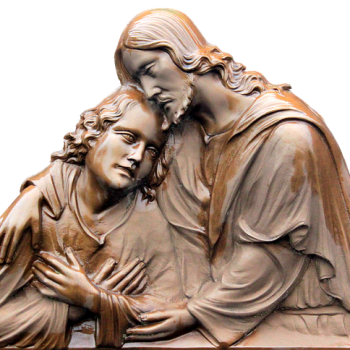Have you felt ignored by the media as a person of faith? I know the answer to that one: a bitter laugh and a “Duh, yeah!” A new study, released on September 20, by the Faith and Media Initiative confirms that there is a big gap between the religious/spiritual coverage people want and what is provided by the various forms of media.
Some of my friends say they have stopped watching the news. I’ve always thought that choice was an abandonment of our duty as citizens to be aware of and involved in current events, but it could also be a matter of not seeing our values reflected in the news.
Few, if any, reporters consider our perspective as Catholics on social justice, morality, or life issues. Editors rarely assign any religious topics unless they are criticizing the Church or revealing dissent or scandal.
The sex abuse scandal immediately comes to mind. The anti-Catholic press jumped on the opportunity to point fingers at priests, even though, on a list of most frequent offenders, Catholic priests came in a distant fifth after family members, friends/neighbors, teachers/coaches, and Protestant clergy. This last group was not mentioned until the recent findings about abuse among Southern Baptists, and that got short notice.

Am I being paranoid to say, “anti-Catholic press”? No. There is ample evidence for that charge. Now there is also this large study on the general problem of a disconnect between media and religion, and it is a fascinating reveal.
The Study
The Faith and Media Study is the product of groundbreaking research into the “attitudes and perceptions about faith and religion in the media.” It involved a global survey of almost 9,500 people of various religions in 18 countries. An overview of the findings can be found at https://index.faithandmedia.com/projects and the entire report can be downloaded from there.
The study shows that less than 20% of journalists feel that they understand the nuances of faith. In a world where 84% of humankind identifies with religion/spirituality, that’s a problem.
People for whom faith is an integral part of their identity and worldview are not being acknowledged, and they know it. The study found that 59% of people see a need for a more diverse set of religious perspectives in media and 61% think the media perpetuates stereotypes.
Omitted and Stereotyped
It reminds me of the inequity that led to a call for more inclusion for people of color: they seldom saw anyone who looked like them in the movies, on TV shows or commercials, or elsewhere in the media. In like manner, people of faith are not seeing anyone who represents them in the media.
Also, people of color were once stereotyped. If they made an appearance in a movie or TV show, blacks were servants, Chinese ran laundries, and Hispanics were maids or gardeners. None were depicted as educated professionals.
Similarly, religious people suffer severely from stereotypes. We don’t see anyone who acts or thinks like us in the movies/TV. Instead, a religious person is ridiculed as a goody two-shoes, a prude, or a Bible-thumping phony evangelist. Another favorite: religious people are cult members. Sometimes there is a token role as a kindly nun or a compassionate minister, but that’s it.
Can you imagine a TV show about a hospital chaplain instead of a physician or nurse? I think that would be a great drama filled with many of the toughest dilemmas people face in their lives and the coping mechanisms they learn to use (or not). In the current climate, though, no such show would be considered because that would acknowledge that people of faith exist and are worthwhile.
Like minority children who once could not find a good role model in the media, so religious people see themselves put in a negative light. They therefore become afraid of being identified with this stereotypical image and being discriminated against as a result.
The Uncool Other

Fear of being “uncool” causes people to shy away from their religion and to stop participating. This is described in the study as becoming “the other.” We are seeing this effect in American society as church attendance keeps dropping and secularism keeps rising.
A prime example of media stereotyping scaring off participants is in the pro-life movement. Even those who understand the pro-life message will not get involved because they do not like the messenger—or the one they think is the messenger because of the media. To look reasonable and compassionate you have to be pro-choice, and too many people will not risk popularity points to stand up as pro-life.
There is now an effort to produce Christian movies, but they tend to be amateurish because major studios won’t handle them—a mistake because there is a huge, but ignored, audience for these movies, and they make money. That should be no surprise—the Christian retail market does over $4.6 billion in sales annually, which reflects a massive customer base.
Reviewers always describe Christian movies as trite, preachy, and saccharine. It’s so tale-tell when Rotten Tomatoes reports a dismal rating by reviewers but an audience rating over 90%. This reaction is evidence that the transformative (as in comforting or fulfilling) nature of religion should be depicted more.
Clueless Newsroom, Offended Majority
Although I am responding to the study with American examples, it is important to remember that this study involved people from all over the world and numerous religious faiths. People in the media should take note that one-third of these people follow a faith-based news source; in some countries it’s many more.
Whether for movies or news broadcasts, the global audience is majority religious. So, it doesn’t make good business sense to cater to a minority. It’s astoundingly self-defeating considering that customer surveys usually dictate every business decision.

Nonetheless, religion is ignored to the point that 43% of people think the media is not only not serving them but is also creating unease and anxiety that further fragments society and promotes a culture that is offensive to religious people. Since editors demand controversy in a story, writers seek interviews with dogmatic extremists instead of spokespersons from the mainstream.
One of the reasons for this huge misstep by the media is that, in their ignorance of religion, they ask the wrong questions in their surveys and thus get misleading answers that don’t account for how strongly people feel about faith or how much they need to see religious lifestyles as a legitimate choice.
In short, people involved in the media are clueless. I read once that the average reporter was a “C” student. They are not our best and brightest, yet they think they are smarter and super-cool because they are on TV, in the movies, or have the power to feed the public whatever fits their own agenda.
An example of the clueless reporter is an interview I saw between a giddy TV anchor and Mother Dolores Hart when she was on a book tour for her autobiography. That Mother Dolores went from a rising movie star to a cloistered nun is an amazing story.
The main point about the book, of course, was Mother Dolores’ choice to follow a life of prayer rather than of celebrity. However, the dimwit interviewer didn’t even get close to questions about Mother Dolores’ 50+ years in the convent. Instead, she wanted to ask only about the movies Mother Dolores made with Elvis Presley!
Helping Them Help Us
Journalists themselves admit that faith coverage is marginalized. Newsrooms rarely reflect the plurality of religious views and often don’t have a specialist assigned to a religion beat.
Religious institutions could help make up for that lack. The study showed that 43% of people want media to be provided with spokespersons who have experience living as a person of faith. Also, churches and faith organizations could provide basic media training and background engagement.
In return, the media should put as much high-quality attention on religious stereotypes as has been done on racial and gender stereotypes; that is, be a force for positive change rather than reinforcing prejudice.
Let’s hope this study gets people talking and shakes up newsrooms. Just as Catholics and pro-life organizations are demanding that the Justice Department rigorously investigate the surge in violence against churches and Pregnancy Resource Centers, so the religious public at large should demand better representation in the news and among the media.















